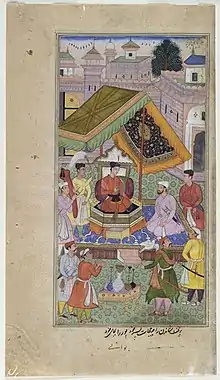| Puru | |
|---|---|
| Texts | Mahabharata, Puranas |
| Personal information | |
| Parents |
|
| Dynasty | Chandravamsha |
Puru (Sanskrit: पूरु, romanized: Pūru) is a legendary king in Hinduism. He is the youngest son of King Yayati and Sharmishtha,[1] and one of ancestors of the Pandavas and the Kauravas. King Puru marries Kausalya, and is succeeded by his son, Janamajeya.[2]
Legend
Bhagavata Purana

In the nineteenth chapter of book nine of the Bhagavata Purana, Puru is described as having four brothers; Yadu, Turvasu, Druhyu, and Anu. He exchanges his youth for the old age of his father Yayati when the latter gets cursed by Shukracharya, allowing his father to enjoy his youth for a thousand years.[3] Afterwards, Yayati takes back his curse and makes Puru his heir, though he is the youngest of them all.[4] His successor is Práchinvat; his son is Pravíra; his son is Manasyu.
Mahabharata
In the Mahabharata's Adi Parva, he is said to have inherited his kingdom in the Gangetic plain. He is said to have three mighty heroes as sons by his wife Pauṣṭi; Pravīra, Īśvara, and Raudrāśva. Pravira succeeded Puru, and was in turn succeeded by his son, Manasyu.[5]
Puru's dynasty becomes the Puruvamsha, which was later renamed as Kuruvamsha, to which the Pandavas and the Kauravas belong.[3]
Rigveda
Another Puru is mentioned as a king in the Rigveda and as the father of Adityas, married to Aditi, living and ruling over and area of the Sarasvati river.[6]
See also
Further reading
- Mahabharata, Adiparva, verse. 71-80.
Notes
- ↑ Mayank Srivastava (7 May 2020). "Story of Devayani, Yayati, Sharmishtha, Puru". newstrend,news (in Hindi). Retrieved 9 May 2020.
- ↑ www.wisdomlib.org (2012-06-16). "Puru, Pūru, Purū: 19 definitions". www.wisdomlib.org. Retrieved 2022-11-10.
- 1 2 David Frawley (1993). Gods, Sages and Kings: Vedic Secrets of Ancient Civilization. Motilal Banarsidass. pp. 137–. ISBN 978-81-208-1005-1. Retrieved 4 October 2012.
- ↑ www.wisdomlib.org (2019-01-28). "Story of Pūru". www.wisdomlib.org. Retrieved 2022-11-10.
- ↑ Krishna-Dwaipayana Vyasa (31 March 2008). The Mahabharata of Krishna-Dwaipayana Vyasa First Book Adi Parva. Echo Library. pp. 214–. ISBN 978-1-4068-7045-9. Retrieved 4 October 2012.
- ↑ K. C. Singhal; Roshan Gupta (1 January 2003). The Ancient History of India, Vedic Period: A New Interpretation. Atlantic Publishers & Dist. pp. 48–. ISBN 978-81-269-0286-6. Retrieved 4 October 2012.
References
- Dowson, John (1888). A Classical Dictionary of Hindu Mythology and Religion, Geography, History, and Literature. Trubner & Co., London.
- Mani, Vettam (1964). Puranic Encyclopaedia. Motilal Banarsidas, Delhi. ISBN 0-842-60822-2.
